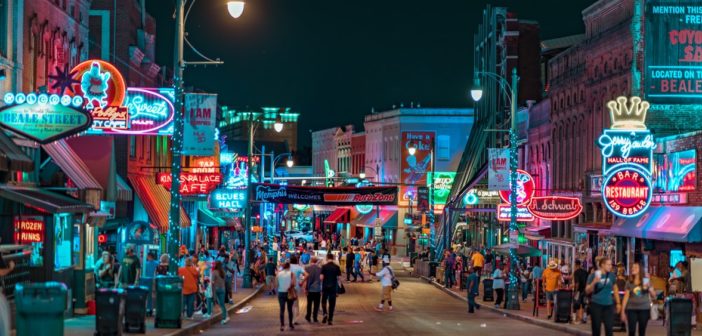Without a doubt, the city of Memphis, Tennessee is one of the greatest music pilgrimage sites in the entire world. Home to everyone from Elvis Presley to B.B. King to Alex Chilton, Memphis has one of the most remarkable musical histories of any city anywhere. Here are just a few reasons why Memphis is justly famous for its musical heritage, and why a visit here is a must for anyone who loves blues, soul, or rock music.
1. Memphis Was a Major Focus Point in the Development of Blues Music
At the beginning of the 20th Century, Memphis was a place where rural sharecroppers with a knack for country blues music could meet up with one another and play music together. These impromptu performances were instrumental in the development of what we know today as Memphis blues music, and its performers changed the history of music as we know it.
Mostly gathering around the city’s famous Beale Street, these musicians took blues music to new heights. They would also influence later “electric blues” musicians (and fellow Memphis residents) like Howlin’ Wolf, B.B. King, and Ike Turner.
2. Memphis Was Where Elvis Presley Honed His Signature Style
It’s no secret that Elvis Presley loved Memphis. Although he grew up about 80 miles south of the city in Tupelo, Mississippi, Elvis purchased his Graceland estate here after his recording career took off in earnest, and unless he was on tour, Elvis and the city were practically inseparable.
3. Memphis is the Birthplace of Rock and Roll
Thanks to the Sun record label and its in-house recording studio, everyone from Johnny Cash to Elvis Presley got their start in the music industry by recording in Memphis. Sun Studio had its own unique sound to offer up and its stripped-down environs and signature “slap-back” echo effect were central to the development of early rock music. You can still hear the characteristic Sun Studio sound on songs like “Mystery Train” by Elvis Presley, “Blue Suede Shoes” by Carl Perkins, “Great Balls of Fire” by Jerry Lee Lewis, and “Cry Cry Cry” by Johnny Cash.
4. Memphis Was a Second Home to Singer Jeff Buckley
While recording the follow-up to his critically-acclaimed first record “Grace,” Jeff Buckley decided to get back to his rock music roots by moving into a small house in Midtown Memphis. Well-versed in the musical history of the city, Buckley hoped that Memphis’s eerie musical mojo would rub off on his recording sessions. Unfortunately, the city had tragic things in store for him: In a freak accident in 1998, Buckley drowned in the city’s Wolf River Harbor. He was only 30 years old.
5. Memphis Produced Power Pop Heroes Big Star
In the early 1970s, Stax Records was one of Memphis’s most successful recording outfits. Keen to sign a local band headed by ex-Boxtops singer Alex Chilton, the label agreed to release an album by Chilton’s new project Big Star. The band’s albums were commercial flops, but a huge cult following developed around Big Star after the band broke up. Nowadays, Big Star is regarded as one of the greatest bands in the city’s history. They’ve influenced everyone from Elliott Smith to Wilco.
6. Beale Street and Its Legendary Music Venues
As many Memphis music aficionados will tell you, Beale Street has been the home of Memphis blues music for over 100 years. The street’s nightclubs are justly regarded as legendary, and visitors can still hear amazing music on Beale Street seven nights a week. Indeed, a visit to a classic Beale venue like the Stax Museum of American Soul Music can still be a life-changing experience.
7. Memphis Was Home to Otis Redding
Last but not least, Memphis was once the home of one of soul music’s greatest practitioners. The city was where Otis Redding got his start, and the singer often credited Memphis with launching his career. He remains one of the area’s favorite musical sons, and many Memphis old-timers can tell you about the times they saw Redding perform here when he was still working a day job in Memphis as a valet.




